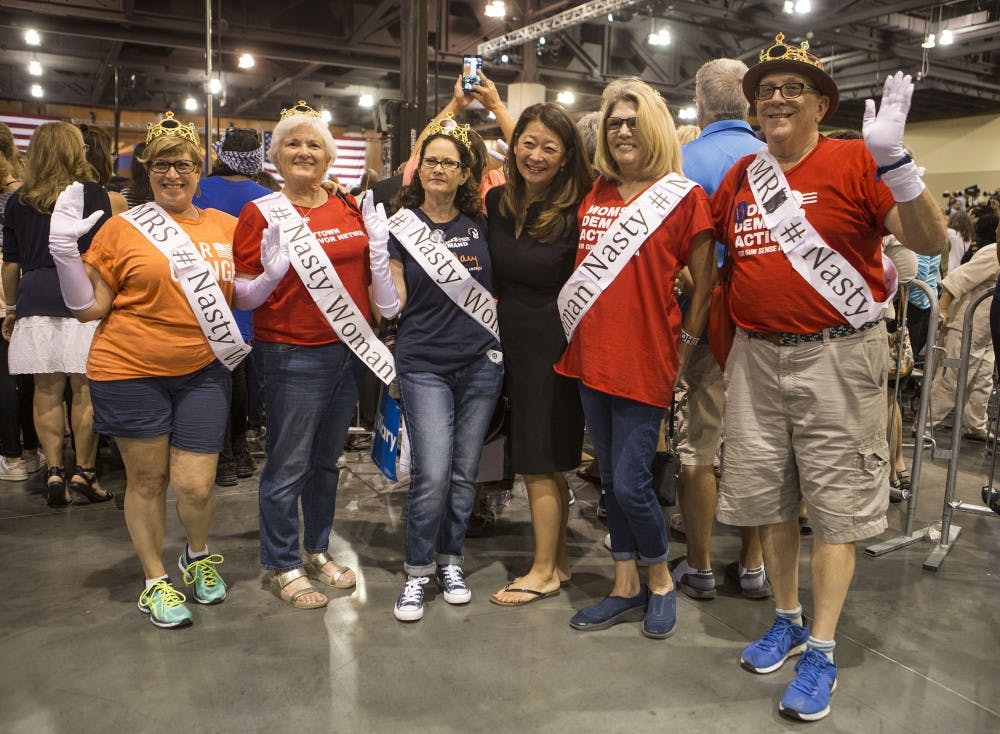It was the insult heard around the world when Donald Trump called Hillary Clinton a “nasty woman” at the final presidential debate. Women everywhere, all too familiar with derogatory terms being flung their way, took to Twitter to make the term their own.
In no time, #NastyWomen began trending. Vox even made a fake commercial for “Nasty Woman” perfume.
Reclaiming terms can be a powerful tool for dealing with injustice, but only if it is done very carefully. Some words are so harmful they should be phased out completely.
Terms that are used to degrade women to their core serve no real purpose, and even casual or affectionate uses deserve questioning. “Slut” (and similar words designed to attack a woman’s sexuality) has historically been used to blame sexual assault victims, police women’s clothing and, perhaps most perplexing, to attack a woman for rejecting a man’s advances.
Perhaps you’ve heard “slut” thrown around jokingly. Even when used casually, the term is harmful because the meaning behind it is still negative: a woman is being policed in a way a man never would.
Emily Lindin is the founder of The UnSlut Project. The project has produced a documentary, book and soon-to-be play performed in schools across the country to start discussion on sexual shaming and find solutions to the problem.
Lindin said that while it may seem like a step forward to hear words like “slut” being used in a humorous or affectionate way, the people saying it may not recognize all the harm it represents.
“It’s a little bit disconcerting because those girls are playing into and joking about sexist things in a casual way without recognizing what they’re participating in,” Lindin said.
Words like “slut” aim to completely strip a woman of her value, and it is difficult to see them being used in a positive way when they constitute a deadly form of bullying.
“When you’re a ‘slut,’ that’s all you are," Lindin said of the word's implications. "That’s all you're understood as being worth. It limits the developing of self into a full, confident human being with talent, confidence, skills and weakness and strengths.”
Some insults may roll off one’s back more easily than others and thus be easier to reclaim because they have less negative history attached to them. Lindin said that reclaiming Trump’s “nasty woman” insult was a powerful tool for women, but that this still doesn’t condone insults.
“It was useful for me to associate with other women who were immediately taking its power away," Lindin said. "It was familiar to a lot of women watching it. It was an act of power to reclaim it … ‘Nasty woman’ is still something I wouldn’t want to be called in any other time or place.”
It's also possible to fight degrading terms without necessarily perpetuating the harmful ideas behind them. Amber Rose’s “Walk of No Shame” video shows the star being proud of her decision to engage in casual sex — no shame attached. (Warning: Explicit language)
It's also important to note that the ability to reclaim an insulting term requires privilege. Black Women’s Blueprint, an organization that empowers African American girls and women, responded to the first SlutWalk in 2011 with a reminder that women of color often are not represented in reclaiming movements. Because words like “slut” and “ho” have historically been deployed at women of color as tools of racism, it is difficult to rebrand them for empowerment. The dynamic intersection of racism, sexism and other prejudices indicates that some groups feel they can’t afford to reclaim degrading terms.
Examining the way we use language isn’t about political correctness or stripping away first amendment rights. There are more than a million words in the English language. I promise you can find plenty of things to say that don’t dehumanize another person or reinforce systematic oppression.
As a feminist, I believe in a woman’s right to choose how she lives. If you feel empowered by a certain term, own it. Feminist icon Gloria Steinem has encouraged women to say “thank you” when called a bitch. I have personally joked about going into my “boss bitch” mode when it’s time to get something done. This doesn’t mean I’m not firmly against all the harmful ways the word bitch has been used to put women in their place for centuries.
Define yourself however you please and rock whatever labels make you proud. But be mindful of the implications some terms have for other people. Know what you are condoning.
Reach the columnist at lallnatt@asu.edu or follow @LibbyAllnattASU on Twitter.
Like The State Press on Facebook and follow @statepress on Twitter.
Editor’s note: The opinions presented in this column are the author’s and do not imply any endorsement from The State Press or its editors.
Want to join the conversation? Send an email to opiniondesk.statepress@gmail.com. Keep letters under 300 words and be sure to include your university affiliation. Anonymity will not be granted.




